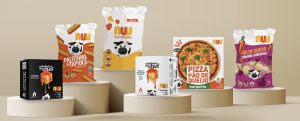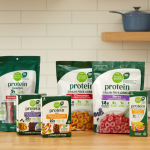Brazilian Regenerative Startup NUU Secures $4 Million in Series A Funding
NUU, a Brazilian startup of regenerative cassava-based foods, has just raised a series A investment round. Founded and led by women, boasting an entirely female C-Suite, this certified B Corporation has already achieved a positive EBITDA and has secured USD 4 million in funding, led by the impact-focused EcoEnterprises Fund, alongside other domestic and international investors, including CamelFarm, GV Angels, Gávea Angels, Newlin, MadFish, Bioma Food Hub, and angel investors.
The Brazilian startup is set to invest in marketing, sales, technology, and innovation to expand the footprint of their natural cassava-based products business. With an established distribution network in the Southeastern region of Brazil, NUU operates its own eco-conscious factory. Here, they not only craft the renowned Minas Gerais cheese bread (pão de queijo) but also offer an array of products, including tapioca sticks, pizza with a cheese bread crust, naturally hued cheese bread, and the iconic “tapioca dadinho,” a creation by Chef Rodrigo Oliveira of the Mocotó restaurant, garnering acclaim throughout the country.
This injection of funding signifies a strategic shift towards substantial investments in sales and marketing, as highlighted by CEO Rafaela Gontijo. She envisions an eightfold growth in a span of two years, with aspirations to reach 6,000 points of sale. “Up until this point, we’ve experienced organic growth without any significant marketing efforts. We want to convey to consumers why NUU represents positive impact and why it truly matters,” she remarks. “People desire to savor indulgent foods that evoke emotional connections, yet without inflicting harm on their well-being and the environment,” she adds. “This journey encompasses the entire spectrum from soil to plate. We calculate the carbon footprint of our products, fully offset our packaging, harness clean energy for production, and bring regenerative production models to small rural producers.”
As a startup aligned with the ethos of Conscious Capitalism, and with the CEO’s recognition in Forbes’ Top 100 Women in Agriculture, NUU integrates carbon footprint data onto its packaging and boasts certifications such as Eu Reciclo, Women Owned, SVB, and B Corp. Notably, it has also been honored by the United Nations, securing its place among the world’s 50 enterprises awarded the title of “UN Best Small Business: Good For All.”
Selected in August to participate in the Jornada Amazônia program, NUU leverages technology and innovation to elevate the profile of cassava, a quintessential Brazilian root originating from the Amazon rainforest and a cornerstone of indigenous cuisine. The goal is to reimagine its presentation in various forms on Brazilian dining tables. “Our initial innovation in this category involved transforming pizza crust, traditionally made from wheat, into a cassava starch-based alternative,” elucidates Julia Dabés, the COO of the startup. “Given the Russia-Ukraine conflict, wheat prices surged by 30% in Brazil. We’re compelled to cultivate more resilient food systems, necessitating localized sourcing,” she points out. This strategic alignment with the pizza launch mirrors the trajectory of Caulipower, an American company that leveraged cauliflower as a base ingredient, cultivating a gluten-free portfolio and achieving a revenue of USD 100 million in 2021.
Through a robust omnichannel approach, NUU has established a wide-ranging presence in various retail outlets, both traditional and digital. It has also expanded into the food service sector through partnerships with notable entities. The brand also collaborates with purpose-driven organizations and leverages its own website along with delivery platforms for direct sales.
“We aspire to be the main ally of the new era of frozen foods in Brazilian retail. Our approach involves adopting an agile and decentralized methodology to generate value at the grassroots level. With my background in the technology sector, the challenge now resides in transposing this rapid scaling dynamic into the realm of traditional retail,” underscores Maíra Rabelo, Director of Growth, who has previously contributed to companies like VTEX (a Brazilian technology multinational focused on cloud commerce) and Zé Delivery (a startup developed by the Brazilian beverage company AmBev). “The pandemic years have instigated novel behaviors, characterized by an increased quest for convenience coupled with heightened mindfulness about conscientious consumption. This trend has reached an apex in the United States, with projections indicating even greater expansion in the upcoming years, and now it’s making its way to Brazil. We are just beginning to tap into the vast potential of the frozen food market; It’s a vast unexplored domain.”
About NUU
Sustainability lies at the heart of NUU’s identity. The name pays homage to the iconic Minas Gerais expression “nuu,” an abbreviation of “nossa!” – a Brazilian term of surprise or amazement. This also encapsulates a product that is “nu”: “naked” in the sense of being free from gluten, artificial colors, flavorings, and unnecessary additives. Beyond this, the brand’s ethos revolves around the essence of simplicity, crafting recipes that hinge on a minimalist ingredient palette. The journey commenced in Patos de Minas (Minas Gerais state), a locale deeply intertwined with Brazil’s agribusiness heritage. It was here that Rafaela Gontijo made the pivotal decision to transition from her role in a multinational corporation to the realm of entrepreneurship. Inspired by the savory essence of cheese bread (pão de queijo) that had delighted her senses on her childhood farm, she embarked on a journey to infuse her company with an unwavering dedication to quality and a profound connection to nature.
Commencing on a modest scale, with cheese bread sales at local markets in Rio de Janeiro, the enterprise gradually expanded its clientele, eventually establishing its presence in major markets such as Pão de Açúcar, Carrefour, Zona Sul, as well as coffeehouse chains across São Paulo, Rio de Janeiro, Minas Gerais, and Espírito Santo. In 2021, in consonance with circular economy principles, the company established its own eco-friendly factory, harnessing clean and renewable energy sources, collecting rainwater, and implementing wastewater management systems.
For More Information:
https://www.nuualimentos.com.br/
















![[Updated] Oats Overnights Secures $45M Investment From Astō](https://d2azl42aua8mom.cloudfront.net/wp-content/uploads/2026/01/29172259/2026-01-29-oats-overnights-secures-45m-in-growth-equity-from-square-150x150.jpg)
